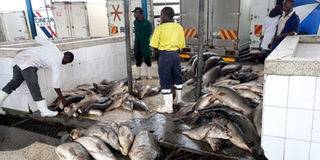Fish handling facilities closed over poor hygiene

Inspection. Fishermen at a handling facility in Kasensero Landing Site pack Nile perch fish in March. PHOTO BY IVAN KIMBOWA
Entebbe. At least 5,000 fishermen and fishmongers are stranded after Ministry of Agriculture, Fisheries and Animal Husbandry closed several fishing handling facilities over poor hygiene.
The affected facilities are at Ddimo, Golo, Kasenyi and Mwena landing sites in Masaka, Mpigi, Wakiso and Kalangala districts, respectively. Others are in Namayingo District.
Mr Tom Bukenya, the acting commissioner of fisheries regulations and control, said the handling facilities lacked minimum standards.
“Despite being gazetted, they are below the required standard in terms of hygiene, we do not want the fish we get from there to affect our international market,’’ Mr Bukenya said in an interview at the weekend.
Dr Edward Rukunya, the director fisheries, said authorities at the handling facilities had been warned several times to improve sanitation.
He said inspection of landing sites on the eastern side of Lake Victoria is ongoing, adding that those without minimum hygiene standards comprising at least a public pit-latrine will be closed.
Mr Willy Lugoloobi, the Kalangala chairperson, faulted the ministry officials for closing the facilities before engaging district authorities.
“Mwena fishing handling facility meets all the standards, it is one of the best we have in Kalangala and if at all they wanted to close it, they could have sent a notice of closure which we have not yet received,” he said.
However, Mr Jackson Baguma, the district fisheries officer, said they had received notice of closure.
“Entry and exit of people at the fish handling facility has to be restricted to avoid compromising standards,” he said.
Kalangala has 56 landing sites but only eight are gazetted.
Mr Samuel Bwanika, a fisherman at Ddimo, said they would incur extra costs in order for their fish to be inspected.
“Closing our fish handling facility means the resident fish inspector cannot inspect our fish. We have to take it (fish) to another gazetted facility for inspection, which is costly,” he said. Mr Ali Mukiibi, a fisherman at Kasenyi Landing Site, said the action had kicked him out of business until the facility resumes normal operations.
“I cannot afford taking my fish elsewhere. I have stopped fishing until the facility is reopened,” he said.
Soldiers close facilities
In the past couple of years, the Fisheries Protection Unit (FPU) under the Uganda People’s Defence Forces soldiers has closed several fish landing sites over engaging in illegal fishing
For example, out of 15 landing sites in Masaka, only four are operational. Other businesses such as bars, lodges, shops, restaurants and fuel stations at the landing sites were also affected.
Lt Col James Nuwagaba, the FPU commander, said the landing sites were being used by unscrupulous fishermen to deplete the lake.
Fishing industry
The fisheries industry is the second largest foreign exchange earner, contributing 2.6 per cent of Gross Domestic Product (GDP) and 12 per cent to agricultural GDP. According to Ministry of Agriculture records, Uganda has a fish capture potential of 750,000 tonnes annually, the current production is at 461,000 tonnes and 100,000 tonnes from aquaculture.
A 2010 UN habitat report on the water and sanitation initiative in landing sites on Lake Victoria found that 76 per cent of the population lacks access to sustainable supplies of safe drinking water, 72 per cent lack access to improved sanitation while less than five per cent of the garbage is collected by local authorities.
According to Water Aid Uganda recent findings, around 26,000 children die every year from diarrhoea which is caused by unsafe water and poor sanitation in Uganda. A world Bank Water Sanitation Programme report, 2012, poor sanitation is costing the country at least Shs389billion annually.




